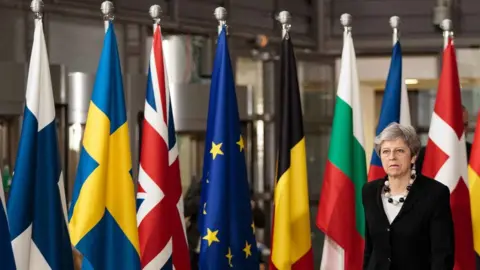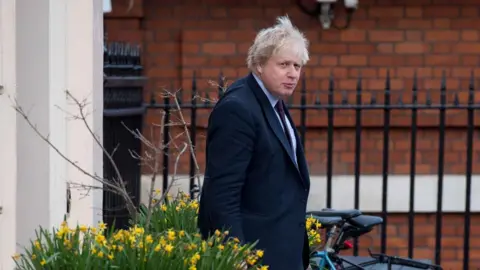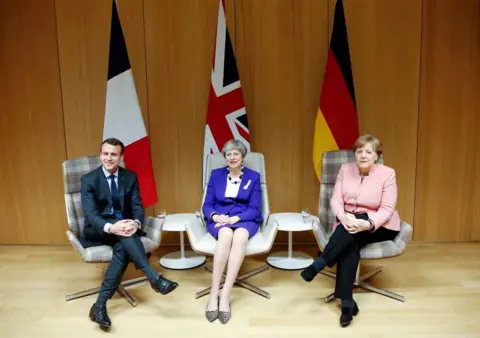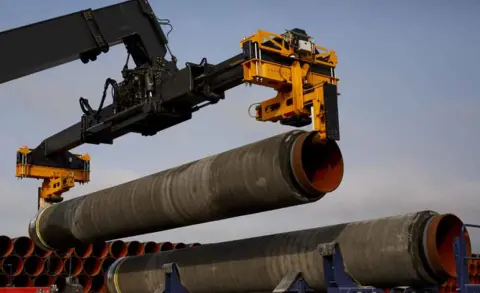Has the Russian row given UK diplomacy new focus?
 Getty Images
Getty ImagesThe WhatsApp group is both a bane and boon to modern working life. Her Majesty's Foreign and Commonwealth Office is no exception. And in a recent exchange between senior officials at King Charles Street a simple phrase expressed the collective frustration of many: "(Expletive) elephants!"
This was a reference to the increasing occupation of the foreign secretary with the welfare of animals. A brief perusal of Boris Johnson's Twitter feed confirms this. He is much concerned with the trafficking of pangolins.
While many denizens of the Foreign Office are no doubt deeply concerned with the continuing survival of these particular fauna, there are others who would also prefer their boss to concentrate a little more closely on perhaps more strategic elements of British foreign policy.
The focus of their frustration is the government's strategy entitled "Global Britain". The aim of this policy is to show that the UK will remain internationally engaged after Brexit. It argues that Britain has a unique blend of assets that gives it a special place in the world. These include hard power - its membership of Nato and its status as one of Europe's major military and intelligence powers; soft power - its language, universities, BBC World Service and so on, its diplomatic clout as a close ally of the US and a permanent member of the UN Security Council, and its values as a liberal standard-bearer for human rights and the rule of law.
That, at least, is the theory behind Global Britain. But in practice it is much maligned as a slogan in pursuit of a strategy. The Foreign Affairs Committee recently issued a report saying Global Britain risks being seen as a "superficial branding exercise" unless ministers actually set out what it means in practice. Others believe it is a post facto justification for Brexit, an attempt to convince other countries that the UK is not turning in on itself. Other critics go even further and see Global Britain as a post-imperial fantasy by nostalgic Brexiteers.
 PA
PABut here is a question - has the confrontation with Russia over the Salisbury nerve agent attack finally given the Foreign Office an issue through which Global Britain can come of age? Here is a crisis where the UK can use its assets to unite allies against Russia, to use the incident as a catalyst to unlock wider diplomatic action against Moscow that has been long coming. Here is an issue where the UK can show some leadership and persuade European allies that while it may be leaving the EU, it is by no means leaving the wider European defence and security alliance.
One can argue that this strategy has borne some fruit. Theresa May has succeeded in uniting her European allies behind Britain's position on Russia. They have agreed formally that it is highly likely that Russia was responsible for the Salisbury attack, saying there was "no plausible alternative explanation". The EU has taken the extraordinary step of recalling its ambassador from Moscow.
To get 27 other EU member states to sign up to this language is a significant diplomatic success for the UK. One has to remember that there are many countries in the EU that are economically and politically far closer to Moscow than the UK. It is frankly surprising that countries like Greece, Italy and Hungary are prepared to put their names to a statement that is so critical of Russia. Mrs May clearly shared enough intelligence about the attack to ensure that an alliance of Berlin, Paris, the Baltic and Eastern European states would persuade the rest of the EU to fall in line.
 Getty Images
Getty ImagesAnd the diplomatic work behind the scenes is also showing results. UK officials have quite sensibly not been asking for things they know the EU could not agree. For example, the UK has not sought tougher EU sanctions against Moscow. They know this would not be agreed and would be used by Russia to illustrate EU division.
Instead, the UK has been playing a longer game, looking for allies to step up pressure on Russia unilaterally, arguing that Salisbury is just the latest example of a pattern of aggressive behaviour that affects them all. The UK is saying it will support other countries if they too decide to disrupt Russia's intelligence networks by expelling some spies masquerading as diplomats.
The UK is urging its allies to make sure that Russia feels it is under pressure in every international forum, constantly being asked questions, constantly being put on the back foot. One official told me that by the time of the Nato summit in July, the UK wants Russia to have pulled in its horns and accepted that it over-reached itself in Salisbury.
This, of course, is the rosy scenario. Not all of Britain's diplomacy has been so deft. The decision by Defence Secretary Gavin Williamson to tell Russia to "shut up and go away" prompted MPs to nickname him the Joe Dolce of British politics (after the 1980s one-hit wonder who topped the charts with the song, Shaddap You Face).
The decision by the foreign secretary to compare Vladimir Putin to Adolf Hitler provoked equal brickbats from colleagues, not least because it broke one of the first rules of British politics - never, ever make comparisons with the Nazis. These missteps mattered because they risked turning the confrontation with Russia into a bilateral shouting match between the UK and Moscow. The government's clear intention throughout the crisis has been to ensure that the pressure on Russia remains international.
And there clearly remains a limit beyond which European unity will not survive. It is one thing to unite around a condemnatory statement, it is quite another to agree collective action. David Cameron, with some foresight, took steps to ensure the UK had greater energy independence and security. Other EU countries are far more dependent on the pipelines bringing gas from the eastern steppes and will be reluctant to provoke the Russian bear too much. Will these countries really be ready to punish Russia where it hurts by making it harder for Moscow's elite to make and protect its money overseas?
 Getty Images
Getty ImagesBut right now, UK officials believe Russia finds itself more isolated than it had anticipated and that, in part, is due to British diplomatic and political leadership. Some believe that Global Britain has a bit more flesh on its bones. They argue that Russia and Brexit have, counter-intuitively, led to Britain leaning into European allies more than before. They cite the deepening European diplomatic attempts to protect the Iran nuclear deal from Donald Trump's scepticism.
Others are more sceptical, saying the UK still has to decide its approach to a US that is increasingly unpredictable, to a resurgent and more confident China, and to a Middle East where confrontation between Saudi Arabia and Iran is oft mooted. It still has to work out what role a post-Brexit UK can play in a world - a role that is realistic and pragmatic, not based on false grandeur but a practical use of what diplomatic assets the UK has.
The crisis with Russia may not have turned Global Britain into reality, but it has certainly given diplomats something to work on.
